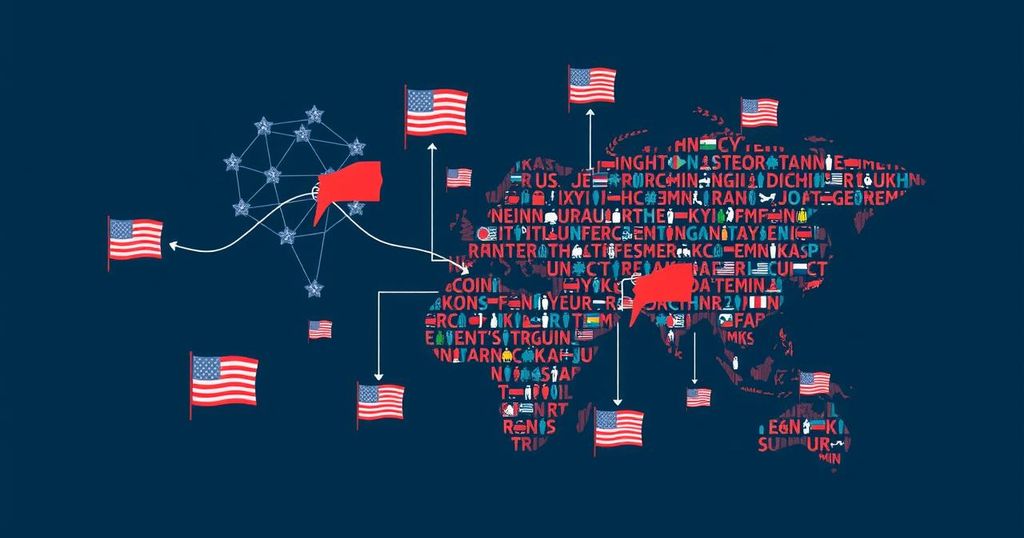Global Implications of the U.S. Presidential Election
The U.S. presidential election symbolizes a critical juncture impacting global relations, encompassing key international issues such as the Israeli-Palestinian conflict, the war in Ukraine, China’s economic strategies, and climate change initiatives. The outcomes will shape the U.S.’s role as a superpower and its engagements with other nations, indicating whether Trump or Harris will lead the country into a new era of foreign policy.
The decision made by American voters in the forthcoming presidential election will resonate far beyond the borders of the United States, influencing global affairs and international relations for years to come. The contest between Vice President Kamala Harris and former President Donald J. Trump encapsulates various international concerns, from geopolitical conflicts to climate change and trade relations. Israel In Israel, the preference among voters significantly leans towards Trump, as polls indicate broad support for his leadership. However, regardless of the victor, long-term implications for U.S.-Israeli relations appear to be limited, as both U.S. parties face challenges in altering the Israeli stance on Palestinian statehood. Should Harris assume the presidency, it is likely she would advocate for negotiations regarding a ceasefire, although U.S. military support for Israel would likely remain intact. In contrast, Trump may encourage more assertive Israeli military actions concerning territories such as Gaza, depending on his evolving views about Iran. Russia and Ukraine The stakes are exceptionally high for both Russia and Ukraine. Trump has implied culpability on Ukraine’s part for the Russian invasion, causing concern among Ukrainians that he may negotiate unfavorable peace terms for their country. In contrast, Harris is viewed as a likely continuer of robust support for Ukraine in its conflict against Russian aggression. Meanwhile, President Vladimir Putin perceives little distinction between Trump and Harris regarding their commitment toward Ukraine, believing both would be less engaged than Biden. China The next U.S. president will adopt a hawkish stance towards China, albeit opinions differ on which candidate would be preferable from a Chinese perspective. Trump’s proposed broad tariffs on Chinese goods could jeopardize China’s economy, while his seemingly less structured approach to international alliances may provide Beijing a sense of respite. Europe and NATO The implications for Europe are pronounced, with a potential Trump victory seen as either catastrophic or advantageous depending on perspectives. European leaders fear the economic fallout from potential tariffs Trump might impose, coupled with his historically contentious relationship with NATO. Conversely, Harris’s presidency might ensure continuity of U.S. commitments but with the admonishment for Europe to shoulder more responsibilities. Global Trade This election can also be characterized as a referendum on global trade practices. Trump’s agenda includes imposing steep tariffs that would disrupt international trade, which economists warn could cause dire economic consequences globally. Harris, while also supportive of tariffs, would likely adopt a more measured stance. South Africa and Mexico In Africa, perceptions diverge regarding the potential outcomes of a Trump or Harris victory. Harris, with her familial ties to the continent, garners more personal resonance, while Trump is viewed by some as a decisive leader. Mexico faces severe repercussions from either candidate; heightened tensions at the border are anticipated under Trump, while immigration policies might persist under Harris due to their connection with Biden’s legacy. Climate Change Lastly, the election’s influence on climate policy is of paramount importance. Should Harris prevail, a continuation of policies toward renewable energy is expected. Should Trump win, his administration’s potential rollback of emissions regulations could impede progress on climate initiatives, slowing the transition to sustainable energy, which poses risks for global climate outcomes. In summary, the upcoming U.S. election is more than a national affair; it is a pivotal moment that will affect international relations, the global trade landscape, responses to climate change, and geopolitical alliances. The outcomes will dictate how America engages with pivotal global issues well into the future.
The significance of the U.S. presidential election resonates on a global scale, reflecting the power dynamics of international relations. As the election approaches, both domestic and foreign policy concerns are at the forefront of public consciousness. The contest between Kamala Harris and Donald Trump highlights the divergent paths for U.S. foreign policy, particularly in relation to conflict zones such as Israel and Ukraine, the economic implications for China and Europe, and broader concerns around global trade and climate change. Understanding these implications requires examining the candidates’ positions and the potential international responses.
The U.S. election presents a pivotal choice that extends far beyond its shores, influencing global stability and policy direction in profound ways. The contrasting approaches of Kamala Harris and Donald Trump will determine the course of significant international relations, affect trade dynamics, and shape responses to global issues like climate change. As Americans cast their votes, the entire world will be watching, aware that their decision will have repercussions that echo across the globe.
Original Source: www.nytimes.com




Post Comment